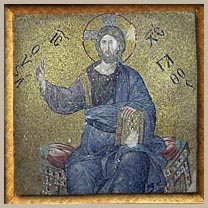Learn 10 Design Tips that are essential to make your website a success.

Chapter XX
Palace saved
Coimrade Gueorguenberguer did not acknowledge himself beaten, and he was resolved at any price to levy blackmail on us, Meanwhile, the Commission of Fine Arts, having become excited over the danger our house had been in, declared it in January, 1918, a "Museum of the People." Thanks to the insistence of my friend, Alexander Polovstoff, and of lV1. Loukomsky, the ownership and guardianship of it were left to me. I undertook to put back the furniture, to take off the coverings which had been put over it as well as over the pictures (a measure of precaution taken when we moved to the house of the Grand Duke Boris) and to allow the public to come in twice a week.
The Bolshevists, who copy Germany in everything, had ordered felt slippers, which every visitor had to put his feet into, as is the practice in the Museum of Sans Souci, Nauen-Insel, and Potsdam. I myself often went round with the visitors. I loved my house so much and all that it contained that I did the honours of it with pleasure. I must do the visitors the justice of saying that they came to educate themselves, and not just out of bravado. Soldiers and sailors questioned me regarding the pictures, and evinced a real feeling for the beautiful. On one occasion only a young girl made a disagreeable remark out loud:
"And to think," she exclaimed, " that all these wonders were hidden from us before the Revolution! "
One day as I was showing the house to some members of the Commission of Fine Arts, Alexandre Benoit, Georges Loukomsky, Serge Korovine, the inevitable TeIepneff, and the Commandant of Tsarskoe, B , the two latter began to laugh:
"Are you prepared to be called before the Soviet? " one of them said.
" Why? " I asked, puzzled and alarmed.
" Well, it is like this. Your friend, Gueorguenbergner, has for some days past been President of the Commission of Enquiry of Tsarskoe-Selo; he wants to make you pay a fine of 150,000 roubles for having concealed the wine. Hold fast, don't give in! We shall support you against him, for we detest him."
Only half reassured, I returned home and, in truth, a document calling for my attendance at noon next day was awaiting me at the house. On the morrow, accordingly, I found my way to the great Palace, and remained waiting in one of the rooms there for a few minutes with two other women. I was called in first. I entered a room half of which was occupied by a table covered with dusty heaps of papers. Near the centre of the table, pale and angry looking, sat Gueorguenbergner. Around him were five or six others, and I recognised among them my wounded man who had kissed my hand after I had bandaged him up. Gueorguenberguer held a document which was trembling a little as he did so. I was absolutely calm before these Revolutionary judges whom I profoundly despised. Gueorguenberguer pointed to a chair opposite to him-the table stood between us. I sat down. .
"For having lied and having hidden wine in her house, the Revolutionary Soviet of Tsarskoe Selo condemns the citizen Paley to a fine of 150,000 roubles," he read out loud.
I made no sign.
"You have heard, citizen? "
"Yes, citizen, I heard you. But I was about to ask you why you ask so little. Why 150,000 roubles and not 500,000 or a million? Why not do the thing thoroughly? And then, if I heard you aright, it is the Soviet which condemns me. Now, I know it is not the Soviet, but you and those who compose this Commission. Therefore I shall go straight from here and ask the President of the Soviet if this decision really comes from him, and I shall tell him the reasons which have actuated you. I shall also ask him whether it is a lie not to indicate to intruders where one keeps things which belong to one."
Gueorguenberguer grew paler than ever. He began to talk in a low voice with those around him. They then withdrew for consultation to a room adjoining. They returned some minutes later. "Citizen," said Gueorguenberger, "the Commission lowers the fine fixed upon to SO,OOO roubles-and allows you three days to execute its decision."
I saw that I had the upper hand. I asked if I might withdraw, and on returning home, I drafted an open letter to the Tsarskoe Soviet. In it I told everything; how Gueorguenberguer came to see us, how he advised us to conceal the wine, then his expectations, his disappointment, his anger, his revenge, and finally his effort at extorting 15O,OOO roubles. I ended my letter by asking that severe steps should be taken against my persecutor who "by underhand measures was discrediting and throwing a shade over the reputation of the entire Soviet."
Telepneff told me next day that my letter had produced an effect like that of the explosion of a bomb! Everybody was thunderstruck, for Gueorguenberguer was regarded as a genuine Communist. He was put on the Index, and a very short time afterwards he vanished from Tsarskoe, and he was never again to reappear on the screen of my kaleidoscope!
At this date, that is to say, about January 15th/ 27th, 1918, appeared the decree of the confiscation of the banks. This meant general ruin, for Russians rarely kept their jewels and valuables in their own homes. For them the bank was "the safest place" imaginable. The consternation, therefore, was general. All securities had gone down to less than a quarter of the price they had formerly represented. There was rlothing left, therefore, but jewellery, and this confiscation of safes was for the Grand Duke simply ruin. He had had consigned to the X. Bank all the jewels he had inherited from his parents, the Emperor Alexander II, and the Empress Marie Alexandrovna. He had had them deposited in my name, fearing that his name of Romanoff might attract the attention and arouse the cupidity of the Revolutionaries. The total value was about 50,000,000 francs, according to the estimate of competent jewellers. Colonel Petrokow told me some days later that they had made him come to the Bank as the Grand Duke's man of business, They spread out on a table necklaces, brooches, pendants, diadems of pearls, and diamonds and sapphires, and emeralds. He saw the eyes of the covetous Israelites sparkle at the sight of these splendours which shone forth in all their splendour from out of their ancient caskets.
"That's where our riches are!" they all shouted at once: "It is the Citizeness Paley who is hoarding them, but we shall get all that back from her! "
Nevertheless, on this occasion they were all put away properly, Colonel Petrokow was given the keys of the two safes, but the Commissaries with the long, black, curly locks did not forget where the treasure was kept! . . .
We had now less and less money. I was asking myself with feelings of anguish how we were going to live when suddenly a large sum dropped down on us from Heaven! A very rich Petrograd banker, Charles Josephovitch Yaroschinsky, of Polish, origin, sent to me his assistant, also a Pole, to ask whether the Grand Duke and I were in need of anything. From my embarrassed manner he understood that, on the contrary, we were in need of everything. I had in Petrograd, in Marianne's flat, an interview with Yaroschinsky, who gave me a very large sum. At the same period Count de Saint Sauveur gave me 20,000 roubles for the Grand Duke, and gave some money also to Count de Benckendorff, to be conveyed to the Emperor at Tobolsk. I know that Yaroschinsky, for his part, sent money, linen, and clothes to the Emperor. This noble thought does honour to these two men, of whom one was a friend, but I scarcely knew the other. His act was none the less fine.





